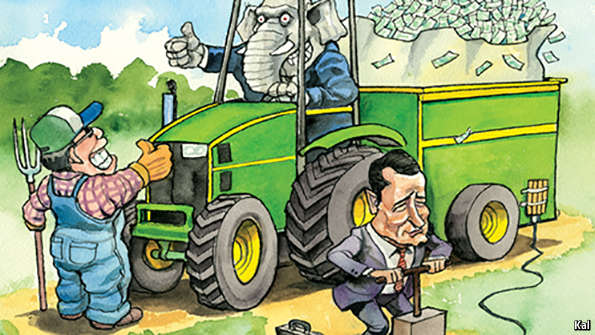
Posted on 05/18/2016 2:26:28 PM PDT by jazusamo
The Environmental Protection Agency (EPA) wants to increase the amount of ethanol and other biofuels in the nation’s fuel supply.
But the volumes proposed Wednesday under the renewable fuel standard (RFS) still fall under targets written into the 2007 law that created the program.
That ended up angering both the ethanol industry, which wants more of its product to be mandated, and the oil industry, which wants the program rolled back. The agency plans to mandate that 18.8 billion gallons of biofuels be blended into the country’s gasoline and diesel supply next year.
Of that amount, 14.8 billion gallons can be traditional corn-based ethanol, while the rest would be filled out by biodiesel, cellulosic ethanol and other nonfossil-fuel liquids.
It’s the second year in a row in which the EPA is relying on a piece of the law that allows it to set lower ethanol levels than called for, citing problems like a lower demand for gasoline and diesel than Congress envisioned in 2007.
“The Renewable Fuel Standards program is a success story that has driven biofuel production and use in the U.S. to levels higher than any other nation,” Janet McCabe, acting head of the EPA’s air office, said in a statement. “This administration is committed to keeping the RFS program on track, spurring continued growth in biofuel production and use, and achieving the climate and energy independence benefits that Congress envisioned from this program.”
Under the program, the EPA sets annual levels for biofuel blending. Oil refiners then must either blend those fuels into traditional fuels, or pay on the open market for credits from other companies that have sold the fuels.
The ethanol volume is an increase of about 300 million gallons from this year, and the biofuel total is an increase of about 700 million gallons.
After years of delayed volume mandates and levels that didn't please either side, both ethanol and oil representatives disagreed with McCabe’s assessment that the program is getting back on track.
“For months, EPA has been saying it plans to put the program ‘back on track.’ Today’s proposal fails to do that,” Bob Dinneen, president of the renewable fuels association, said in a statement.
“The agency continues to cater to the oil industry by relying upon an illegal interpretation of its waiver authority and concern over a blend wall that the oil industry itself is creating.”
The National Biodiesel Board said the EPA’s biodiesel figure is also too low and underestimates industry growth. Biodiesel volumes under the proposal are 2.1 billion gallons, 100 million above 2016.
“We appreciate the EPA’s timeliness in releasing these volumes and its support for growing biodiesel use under the RFS, but this proposal significantly understates the amount of biodiesel this industry can sustainably deliver to the market,” said Anne Steckel, vice president of federal affairs at the biodiesel group.
The American Petroleum Institute (API) said the renewable fuel standard is still broken.
“Consumers’ interest should come ahead of ethanol interests,” Frank Macchiarola, downstream group director for API, said in a statement. “EPA is pushing consumers to use high ethanol blends they don’t want and that are not compatible with most cars on the road today. The administration is potentially putting the safety of American consumers, their vehicles and our economy at risk.”
The API argues that increasing ethanol volumes will spur increased use of E15 — gasoline with 15 percent ethanol — which isn’t approved for use in most cars on the road.
The EPA is required to make final its 2017 biofuel volumes by Nov. 30, a deadline it frequently misses.
I’m trying to clean a carburetor that is encrusted with ethanol induced corrosion. Once you see what ethanol can do, you will know how insane the ethanol standards are.
If it ain’t workin’.....
... double down!
Wait! Ted Cruz said “Ethanol Bad!”
So, how is it you can support him on that?
Ethanol is a disaster for boar owners. Thankfully there are a smattering of ethanol-free gas suppliers where I live.
Ethanol is a huge scam. It is bad for older automobile engines and components. It is a way to get rid of older vehicles in the fleet. This is one of the primary reasons the government continues to push it. They want older vehicles to be replaced by newer more efficient vehicles.
I hear you...It’s deadly on small engines too.
Haven’t most environmentalists admitted that studies show that ethanol produces more C02 emissions than gasoline?
boar = boat. Damn dark keyboard.
Ethanol will ruin a car’s engine. At 5% the damage is minimal. Once you get higher than that your car’s engine is in danger.
Go to a Uniform National Primary on a single day in the Spring. Politicians would no longer have to step and fetch and trip all over themselves trying to suck up to Iowans.
Then amazingly....{poof}.......no ethanol subsidies.
Ethanol corrodes fuel systems, lowers gas mileage and adds to pollution. What’s not to like? GET RID OF THIS AGENCY OF FOOLS!!
That carburetor deserves all the corrosion it get - 'cause carburetors are evil Gaia killing devices. [/sarcasm]
Exactly and that’s the big story. There are many many more small engines vs cars/trucks. Small engines will cost huge amt to replace.
All Small engine owners/opreators/homeowners/landscapers/marine, and on and on need to band together and stop this crap.
I don’t know how to organize this type thing on a grand worthwhile scale or I would.

I know that Trump came out for an increase to 15% ethanol mandate. Can’t be all bad.
Disclaimer: Opinions posted on Free Republic are those of the individual posters and do not necessarily represent the opinion of Free Republic or its management. All materials posted herein are protected by copyright law and the exemption for fair use of copyrighted works.